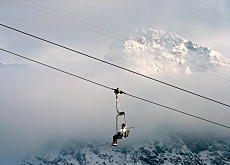
Skiers cover up their carbon tracks

High up in the Swiss Alps, Arosa has introduced a scheme to offset the carbon dioxide emissions produced by holidaymakers in the mountain resort.
To compensate for greenhouse gases, Arosa promises to invest in renewable energy production for every guest who books a ski package through the tourist office.
To benefit from the deal, visitors must be willing to fill out a form declaring the details of their journey – the mode of transport and distance covered, the standard of hotel, and whether a ski pass is requested or only a pass to use the lifts to access winter hiking trails.
A typical tourist comes from either Switzerland or Germany and travels to Arosa by train or by car.
A couple of skiers from Frankfurt travelling by car, for example, produce 307.52 kilograms of carbon dioxide emissions during a one-week stay. The figure drops to 130.8 kilograms if those same two people were to take the train and spend the week hiking.
“We have no idea how much CO2 we are responsible for,” agreed Luzius and Wally Walser, a retired Swiss couple who were among the first few hundred holidaymakers to make a “climate neutral” booking.
The Walsers admitted price and not the environmental cost of their stay was the main reason for the decision since the package was cheaper than paying for their accommodation and ski pass separately.
The tourist office has pledged to compensate for the Walser’s estimated 241 kilograms by financing an equal amount of renewable energy produced at a biogas facility in Germany.
The programme is funded through the income generated by the resort’s tourist tax, which is normally included in the price of the hotel.
Not just talk
“We decided to launch the scheme for a number of reasons. Mountain areas are among the hardest hit by climate change, so we have to do more than just talk about the problem,” Arosa tourist director Hans-Kaspar Schwarzenbach explained to swissinfo.
“And we are providing visitors with added value – instead of a welcome drink, for example, we neutralise their CO2. We also want to highlight how environmentally friendly holidays in Arosa are.
“Not every destination provides a free bus service and you don’t find many resorts where 70 per cent of the accommodation is beside the ski slopes [reducing additional travel].”
A straw poll of skiers by swissinfo failed to find anyone beside the Walsers who had heard of the scheme, and Schwarzenbach admitted that only a few thousand of the 200,000 tourists expected in Arosa this winter would have their carbon offset.
Still, he said about SFr40,000 ($32,000) would be transferred to the biogas facility and much more would follow as the word spread.
Raise awareness
“The most important goal is to do something to raise awareness of the cost to the climate,” Schwarzenbach says. “Temperatures are not forecast to rise by a couple of degrees here as they are in other parts of the world, but by six or seven degrees! Now that’s a problem.”
Part of the message is to convince tourists – western Europeans in this case – to take holidays closer to home, since the journey to a holiday destination, and not the time spent in it, is responsible for the lion’s share of emissions.
“Next winter, there’ll be a TGV [fast train from France] connection between Paris and Chur [hub in southeastern Switzerland] so tourists will only have to change trains once to get to Arosa. That’s the type of guest we want to provide with a climate neutral holiday.”
The Walsers say the scheme is one more good reason to come to Arosa, but they have to think hard when asked what contributes to the carbon footprint they will leave behind.
“The hotel’s heating and electricity,” they say. “And our car – but we haven’t used it since we got up here.”
Instead, the Walsers have taken advantage of Arosa’s free bus service.
swissinfo, Dale Bechtel in Arosa
Arosa is working with the German firm, Climate Partner, to devise the “Climate Neutral” scheme.
The CO2 calculations include, among other things, the journey to and from the resort, the energy use of the hotels and the ski infrastructure.
The carbon is offset by contributions to the Bavarian company, Schmack Biogas, to increase the amount of renewable energy it produces.

In compliance with the JTI standards
More: SWI swissinfo.ch certified by the Journalism Trust Initiative

















![The four-metre-long painting "Sonntag der Bergbauern" [Sunday of the Mountain Farmers, 1923-24/26] had to be removed by a crane from the German Chancellery in Berlin for the exhibition in Bern.](https://www.swissinfo.ch/content/wp-content/uploads/sites/13/2025/12/01_Pressebild_KirchnerxKirchner.jpg?ver=a45b19f3)












You can find an overview of ongoing debates with our journalists here . Please join us!
If you want to start a conversation about a topic raised in this article or want to report factual errors, email us at english@swissinfo.ch.